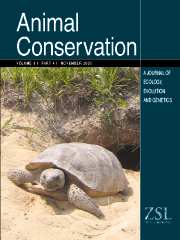Crossref Citations
This article has been cited by the following publications. This list is generated based on data provided by
Crossref.
Rushton, S.P.
Lurz, P.W.W.
Gurnell, J.
and
Fuller, R.
2000.
Modelling the spatial dynamics of parapoxvirus disease in red and grey squirrels: a possible cause of the decline in the red squirrel in the UK?.
Journal of Applied Ecology,
Vol. 37,
Issue. 6,
p.
997.
Daszak, P.
Cunningham, A.A.
and
Hyatt, A.D.
2001.
Anthropogenic environmental change and the emergence of infectious diseases in wildlife.
Acta Tropica,
Vol. 78,
Issue. 2,
p.
103.
Tompkins, D. M.
Sainsbury, A.W.
Nettleton, P.
Buxton, D.
and
Gurnell, J.
2002.
Parapoxvirus causes a deleterious disease in red squirrels associated with UK population declines.
Proceedings of the Royal Society of London. Series B: Biological Sciences,
Vol. 269,
Issue. 1490,
p.
529.
Gurnell, John
Clark, Mike J
W.W. Lurz, Peter
Shirley, Mark D.F
and
Rushton, Steve P
2002.
Conserving red squirrels (Sciurus vulgaris): mapping and forecasting habitat suitability using a Geographic Information Systems Approach.
Biological Conservation,
Vol. 105,
Issue. 1,
p.
53.
Magris, L.
and
Gurnell, J.
2002.
Population ecology of the red squirrel (Sciurus vulgaris) in a fragmented woodland ecosystem on the Island of Jersey, Channel Islands.
Journal of Zoology,
Vol. 256,
Issue. 1,
p.
99.
Greenwood, A. G.
and
Sanchez, S.
2002.
Serological evidence of murine pathogens in wild grey squirrels (Sciurus carolinensis) in North Wales.
Veterinary Record,
Vol. 150,
Issue. 17,
p.
543.
MacDonald, David W.
Moorhouse, Tom P.
Enck, Jody W.
and
Tattersall, Fran H.
2002.
Handbook of Ecological Restoration.
p.
389.
Bertolino, Sandro
and
Genovesi, Piero
2003.
Spread and attempted eradication of the grey squirrel ( Sciurus carolinensis ) in Italy, and consequences for the red squirrel ( Sciurus vulgaris ) in Eurasia.
Biological Conservation,
Vol. 109,
Issue. 3,
p.
351.
Thomas, Kathryn
Tompkins, Daniel M.
Sainsbury, Anthony W.
Wood, Ann R.
Dalziel, Robert
Nettleton, Peter F.
and
McInnes, Colin J.
2003.
A novel poxvirus lethal to red squirrels (Sciurus vulgaris).
Journal of General Virology
,
Vol. 84,
Issue. 12,
p.
3337.
Tompkins, D. M.
White, A. R.
and
Boots, M.
2003.
Ecological replacement of native red squirrels by invasive greys driven by disease.
Ecology Letters,
Vol. 6,
Issue. 3,
p.
189.
FLOWERDEW, John R.
2004.
Advances in the conservation of British mammals, 1954–2004: 50 years of progress with The Mammal Society.
Mammal Review,
Vol. 34,
Issue. 3,
p.
169.
Lurz, Peter W. W.
Gurnell, John
and
Magris, Louise
2005.
Sciurus vulgaris.
Mammalian Species,
Vol. 769,
Issue. ,
p.
1.
McInnes, Colin J.
Wood, Ann R.
Thomas, Kathryn
Sainsbury, Anthony W.
Gurnell, John
Dein, F. Joshua
and
Nettleton, Peter F.
2006.
Genomic characterization of a novel poxvirus contributing to the decline of the red squirrel (Sciurus vulgaris) in the UK.
Journal of General Virology
,
Vol. 87,
Issue. 8,
p.
2115.
Ogden, Rob
Shuttleworth, Craig
McEwing, Ross
and
Cesarini, Silvana
2006.
Genetic management of the red squirrel, Sciurus vulgaris: a practical approach to regional conservation.
Conservation Genetics,
Vol. 6,
Issue. 4,
p.
511.
Tattoni, Clara
Preatoni, Damiano G.
Lurz, Peter W. W.
Rushton, Steven P.
Tosi, Guido
Bertolino, Sandro
Martinoli, Adriano
and
Wauters, Lucas A.
2006.
Modelling the Expansion of a Grey Squirrel population: Implications for Squirrel Control.
Biological Invasions,
Vol. 8,
Issue. 8,
p.
1605.
Gurnell, J.
Rushton, S.P.
Lurz, P.W.W.
Sainsbury, A.W.
Nettleton, P.
Shirley, M.D.F.
Bruemmer, C.
and
Geddes, N.
2006.
Squirrel poxvirus: Landscape scale strategies for managing disease threat.
Biological Conservation,
Vol. 131,
Issue. 2,
p.
287.
Sainsbury, Anthony W.
2008.
Zoo and Wild Animal Medicine.
p.
236.
Sainsbury, Anthony W.
Deaville, Robert
Lawson, Becki
Cooley, William A.
Farelly, Stephan S. J.
Stack, Michael J.
Duff, Paul
McInnes, Colin J.
Gurnell, John
Russell, Peter H.
Rushton, Stephen P.
Pfeiffer, Dirk U.
Nettleton, Peter
and
Lurz, Peter W. W.
2008.
Poxviral Disease in Red Squirrels Sciurus vulgaris in the UK: Spatial and Temporal Trends of an Emerging Threat.
EcoHealth,
Vol. 5,
Issue. 3,
p.
305.
Dunn, Alison M.
2009.
Natural History of Host-Parasite Interactions.
Vol. 68,
Issue. ,
p.
161.
CARROLL, B.
RUSSELL, P.
GURNELL, J.
NETTLETON, P.
and
SAINSBURY, A. W.
2009.
Epidemics of squirrelpox virus disease in red squirrels (Sciurus vulgaris): temporal and serological findings.
Epidemiology and Infection,
Vol. 137,
Issue. 2,
p.
257.




